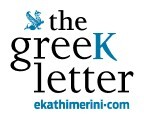 |
Business as usual inbetween leadership elections [InTime News] [InTime News]
Welcome to the weekly round-up of news by Kathimerini English Edition. There was little lull in Greece’s politics between the leadership elections of PASOK over the last two weeks and the SYRIZA party conference on November 8 that will pave the way for its leadership election late that month. As expected, this week’s parliamentary debate between party leaders, officially on the recent fire season and government plans to strengthen the country’s Civil Protection mechanisms, was explosive. After all, this was the first direct confrontation between Mitsotakis and newly re-elected PASOK leader Nikos Androulakis as well as Nikos Pappas’ first debate as interim SYRIZA leader. Prime Minister Kyriakos Mitsotakis set the tone for the debate when he decided to not attend during Pappas’ speech. “I want to be absolutely clear, I do not recognize as the leader of the opposition a politician convicted of misconduct by a vote of 13 – 0 by a special court,” said Mitsotakis later, noting Pappas’ 2023 conviction for breach of duty in the 2016 television license tender. “He is not obliged to like me […] Now, he wants to decide who and how the role of the main opposition will be carried out,” responded Pappas, stating that the prime minister did not have the right to act as a spoiled child. With Mitsotakis returning for remarks made by PASOK leader Nikos Androulakis, it is clear that the prime minister is making efforts to position the third-placed party as the principal opposition in parliament. Recent polls suggest that this reflects the voting intentions of the Greek public, with PASOK now occupying second place and narrowing the gap with ruling New Democracy to just 7.6 points. The center-left party saw internal reshuffling this week following the leadership election, with the establishment of a nine-member coordinating committee. Additionally, unsuccessful candidates Anna Diamantopoulou and Pavlos Geroulanos will oversee political planning and act as parliamentary representative respectively. Spotlight
|
MUST READS
|
 [Shutterstock] [Shutterstock]A study published recently in Kathimerini shows that many Greeks who left the country during the financial crisis, when Greece’s GDP dropped by 25%, are now starting to return home. One hopes that the positive signs turn into a trend, reversing the significant outflow of young, highly educated citizens – the so called “brain drain” of the last decade or more. If that proves to be the case in the medium and long term, the positive impact on Greece’s society and economy will undoubtedly be huge. A significant percentage of those returning are skilled professionals and people with work experience in the private sector, another positive sign. The recorded reversal, the “brain gain”, is the result of different factors, among them ties with friends and family (the strongest incentive), as well as with places. Another important reason that leads people to come back to their homeland is the way of life, which includes traditions but also enjoying Greece’s weather and natural environment. Despite the emphasis given by the government and pundits on tax incentives offered – which are indeed significant – the survey shows that they had less of an impact as the return of most is mainly driven by personal and emotional factors. The study, conducted by the National Documentation and Electronic Content Center, was extensive – 350,000 returning Greeks were surveyed – which gives added weight to its conclusions. Another important conclusion is that institutional reforms and improvements in public infrastructure and government services would strengthen the positive trend even further. The picture is not rosy as the challenges persist and the country has not yet returned to where it was before the crisis; still, the trend, if it continues, can only contribute to the improvement of the situation and Greece’s more rapid and balanced development. |
 Greece continues to record an alarmingly high number of road fatalities with tragedies unfolding on a daily basis, particularly in the country’s urban centers. Additionally, in just July and August there were a total of 38 hit-and-run incidents, compared to a total of 46 for the six previous months according to the SOS Traffic Crimes Association. Overall, Greece ranks joint fifth worst in the EU alongside Portugal for traffic fatalities, with a total of 637 deaths in 2023 or 61 per million residents (compared to the EU average of one per 46 million). There is significant pressure by experts to enact reforms, particularly as they stress that the ongoing effort of Greece’s National Road Safety Strategic Plan (2021-2030) must materialize. Greece continues to record an alarmingly high number of road fatalities with tragedies unfolding on a daily basis, particularly in the country’s urban centers. Additionally, in just July and August there were a total of 38 hit-and-run incidents, compared to a total of 46 for the six previous months according to the SOS Traffic Crimes Association. Overall, Greece ranks joint fifth worst in the EU alongside Portugal for traffic fatalities, with a total of 637 deaths in 2023 or 61 per million residents (compared to the EU average of one per 46 million). There is significant pressure by experts to enact reforms, particularly as they stress that the ongoing effort of Greece’s National Road Safety Strategic Plan (2021-2030) must materialize. |

|
| “The Athens Exchange (ATHEX) general index dipped below the 1,400-point mark and closed at 1,390.25 points, down 3.69% from last week.” |
| “The International Monetary Fund projects that Greece’s primary surplus will rise to 2.1% of GDP in 2024, up from 1.9% the year before, and its public debt will fall to 159% of GDP this year from 168.9% in 2023. It is set to decline to 139.4% by 2029.” |
| “Coastal ship owners and the Panhellenic Seamen’s Federation reached an agreement to bump up wages by 7% over the next two years, following a three-day strike ahead of a long weekend. According to coastal shipping company sources, the strike led to cancellations for more than 100,000 passengers, 15,000 cars, and 9,000 trucks.” |
|
Editor's Pick Today the “strong” Greek economy is massively producing the newly poor – people who are poor or penniless even though they have a job.Read the article Today the “strong” Greek economy is massively producing the newly poor – people who are poor or penniless even though they have a job.Read the article |
| We’d like to hear from youShare your feedback at newsletters@ekathimerini.com |
| Did you receive this email from a friend? |



No comments:
Post a Comment